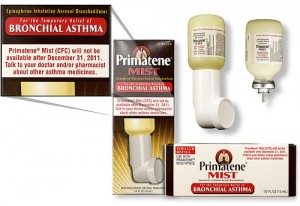Armstrong Pharmaceuticals, the manufacturer of the over-the-counter epinephrine MDI Primatene Mist, has been warning consumers to stock up on the product prior to its phaseout at the end of 2011, and now the US FDA is joining the effort to alert users of the inhaler. Primatene Mist is one of the last CFC inhalers marketed in the US to be phased out in conformance with the Montreal Protocol, and Armstrong will not have an HFA formulation ready to market prior to the December 31, 2011 deadline. No other HFA epinephrine inhalers are available in the US.
The FDA has been holding public discussions about the the phaseout since 2006 and began notifications in 2008. As the phaseout date approaches, however, the agency remains concerned that some consumers may still not have gotten the message. As a result, the FDA turned to the media, holding a conference call with members of the press on September 22.
Karen Riley, a press officer for the FDA’s Center for Drug Evaluation and Research (CDER), began the conference by explaining that the FDA was taking unusually aggressive measures to get the word out that, in her words, “the clock is ticking on Primatene Mist.” “Ordinarily,” she noted, “when FDA has a media briefing, it’s to talk about something new, something that the public doesn’t know about, but that’s not the case with today’s call. It is known, but the problem is it’s not known well enough, and that’s why we are turning to you in the media to get the word out.”
The agency had already taken one extraordinary step, working with Armstrong to include a warning about the impending removal of the product from the market directly on the inhaler packaging. The notice says, “Primatene Mist (CFC) will not be available after December 31, 2011. Talk to your doctor and/or pharmacist about other asthma medicines.”

Packaging for Primatene Mist has included a notice warning consumers about the approaching phaseout
The FDA website also has a number of pages devoted to educating consumers about the need to find an alternate medicine, including a series of questions and answers, consumer updates in Spanish and in Chinese, and suggestions for help paying for alternatives.
Unfortunately, FDA representatives explained, they have no good way to know who is using Primatene Mist and without knowing what types of consumers are using the product, the agency cannot target its message to any specific populations. According to Badrul Chowdhury, director of the Division of Pulmonary, Allergy, and Rheumatology Products of CDER, Armstrong had informed the FDA that it has been selling more than 4 million units per year in the US market, which compares to approximately 50 million units of albuterol inhalers. Chowdury estimates that approximately 1-2 million patients are using an epinephrine inhaler, and the number of those patients using the product as their sole asthma medication is unknown.
At the beginning of the briefing, CDER’s director of the Division of Nonprescription Clinical Evaluation, Andrea Leonard-Segal, asked journalists to pass on information to the public, beginning with “See a healthcare professional now to get another medication to treat your asthma. Primatene Mist may be harder to find on store shelves even before the December 31, 2011. If you haven’t used up your Primatene Mist by December 31, it’s safe to continue using it as long as it hasn’t expired.”


